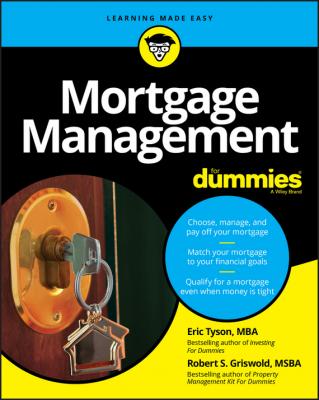Mortgage Management For Dummies. Tyson MBA Eric
Читать онлайн.| Название | Mortgage Management For Dummies |
|---|---|
| Автор произведения | Tyson MBA Eric |
| Жанр | Зарубежная образовательная литература |
| Серия | |
| Издательство | Зарубежная образовательная литература |
| Год выпуска | 0 |
| isbn | 9781119387800 |
To have a reasonable chance of earning more on your investments than it’s costing you to borrow on a mortgage, you must be willing to invest in more growth-oriented, volatile investments such as stocks and rental/investment real estate. Over the past two centuries, stocks and real estate have produced annual average rates of return of about 9 percent. On the other hand, there are no guarantees that you’ll earn these returns in the future. Growth-type investments can easily drop 20 percent or more in value over short time periods (such as one to three years).
Chapter 2
Qualifying for a Mortgage
IN THIS CHAPTER
❯❯ Starting off right with preapprovals
❯❯ Understanding how lenders size up borrowers
❯❯ Solving typical mortgage problems
We love a good thriller. If you’re looking for a spine-tingling mystery, however, Mortgage Management For Dummies isn’t it.
Qualifying for a mortgage shouldn’t be the least bit mystifying. And after you understand how lenders play the game, it won’t be. This chapter removes nearly every bit of puzzlement from the process. We show you exactly how to get started, tell you what lenders look for when evaluating your creditworthiness, and help you solve your mortgage problems – whether you’re looking for a loan as a first-time homebuyer or trying to refinance or pay off your mortgage faster.
Getting Preapproved for a Loan
Everyone knows that time is money, so we decided to begin this section with a timesaving tip. If you’re a homeowner who wants to refinance an existing mortgage, you have our permission to proceed directly to the next section, which discloses how lenders evaluate your credit. This segment applies only to folks who haven’t bought a house yet. (Don’t feel slighted. We devote Chapter 11 entirely to the fine art of refinancing.)
Now, for all you wannabe homeowners, be advised that there’s a right way and a wrong way to start the home-buying process. The wrong way, astonishingly, is rushing out helter-skelter to gawk at houses you think you may want to buy.
Don’t get us wrong; knowing what’s on the market is important. It’s even more crucial to educate yourself so you can distinguish between houses that are priced to sell and ridiculously overpriced turkeys. If you don’t know the difference between price and value, you could end up paying waaaaaaaaaay too much for the home you ultimately purchase. (To find out everything you need to know about buying a home, check out Home Buying For Dummies, by Ray Brown and Eric Tyson [Wiley].)
But … first things first: If you can’t pay, you shouldn’t play.
Suppose you’ve been looking at open houses from dawn to dusk every Saturday and Sunday for the past seven weeks. Just when you begin to think you’ll never find your dream home, it miraculously appears on the market.
You immediately make an offer to buy casa magnífico, conditioned upon your approval of the property inspections and obtaining satisfactory financing. When the sellers accept your generous offer, the bluebird of happiness sings joyously.
Three weeks later, the bird croaks. The loan officer calls to regretfully advise you that the bank has rejected your loan application. The reason isn’t because you offered too much for the house. On the contrary, the appraisal confirmed that the property is worth every penny you’re willing to pay.
The problem, dear reader, could be you. Unfortunately, your present income and projected expenses may be out of whack. You may not earn enough money to make the monthly mortgage payments plus pay the property taxes and homeowners insurance without pauperizing yourself. Adding insult to injury, this depressing discovery is delivered to you after you’ve blown hundreds of dollars on property inspections and loan fees and put yourself through an emotional wringer for three weeks.
Now the good news: It doesn’t have to be this way. After you establish how much you can prudently spend for your dream home, which we cover in Chapter 1, the next logical step is to get yourself preapproved for a mortgage. Then you’re properly prepared to begin your house hunt.
You can use two techniques to get a lender’s opinion of your creditworthiness as a borrower. One is the better way to go. The other is potentially a waste of your time and money and may even be grossly misleading.
We start by critiquing the second-rate method. Loan prequalification is nothing more than a casual conversation with a loan officer. After quickly quizzing you about obvious financial matters, such as your present income, expenses, and cash savings for a down payment, the loan officer renders a down-and-dirty guesstimate of approximately how much money he might lend you at current mortgage interest rates assuming that everything you’ve said is accurate. Most lenders graciously provide a prequalification letter suitable for framing or swatting mosquitoes.
Prequalification is fast and cheap. It rarely takes more than 15 minutes unless you’re the type who has trouble parallel parking.
After you read this section, you’ll understand why formally evaluating your creditworthiness is such a protracted process. Loan preapproval is significantly more involved than mere loan prequalification.
Конец ознакомительного фрагмента.
Текст предоставлен ООО «ЛитРес».
Прочитайте эту книгу целиком, купив полную легальную версию на ЛитРес.
Безопасно оплатить книгу можно банковской картой Visa, MasterCard, Maestro, со счета мобильного телефона, с платежного терминала, в салоне МТС или Связной, через PayPal, WebMoney, Яндекс.Деньги, QIWI Кошелек, бонусными картами или другим удобным Вам способом.
